

Three Myths About “Reading Levels”
2016. Oliver. 57b76261c219f5e7083e9978cd2cd66d. Home - School libraries - guides at NSW Department of Education. As part of Learning Systems, School Libraries provides curriculum and policy advice for NSW Public Schools.
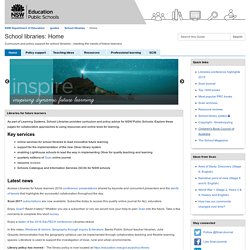
Explore these pages for collaborative approaches to using resources and online tools for learning. Key services online services for school libraries to lead innovative future learning support for the implementation of the new Oliver library system enabling Lighthouse schools to lead the way in implementing Oliver for quality teaching and learning quarterly editions of Scan online journal resource reviews Schools Catalogue and Information Services (SCIS) for NSW schools Latest news Access Libraries for future learners 2016 conference presentations shared by keynote and concurrent presenters and the storify of tweets that highlights the successful collaboration throughout the day. Scan 2017 subscriptions are now available. Enjoy Scan? Enjoy a taster of the 2016 EduTECH conference Libraries strand.
Library policy has moved - The library policy is now located at. Nswtlnet - home. Critical evaluation of information and the Australian Curriculum. Critical evaluation of information and data is a crucial element of information literacy and inquiry learning.
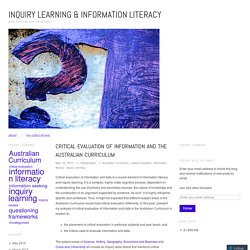
It is a complex, higher order cognitive process, dependent on understanding the use of primary and secondary sources, the nature of knowledge and the construction of an argument supported by evidence. As such, it is highly discipline specific and contextual. Thus, it might be expected that different subject areas in the Australian Curriculum would treat critical evaluation differently.
In this post, I present my analysis of critical evaluation of information and data in the Australian Curriculum in relation to: the placement of critical evaluation in particular subjects and year levels, andthe criteria used to evaluate information and data. The subject areas of Science, History, Geography, Economics and Business and Civics and Citizenship all include an inquiry skills strand that mentions critical evaluation of information and data. Table 1 – Year 5 Science example Like this: Kathy Schrock's Guide to Everything - Home Page.
Teacher Librarian role. The visionary’s hat. Libraries have been part of society’s culture since man first began to convey information by etching images on the walls of caves.
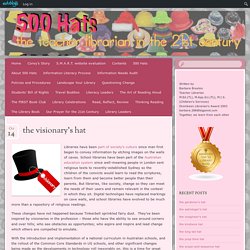
School libraries have been part of the Australian education system since well-meaning people in London sent religious texts to recently-established Sydney so the children of the convicts would learn to read the scriptures, learn from them and become better people than their parents. But libraries, like society, change so they can meet the needs of their users and remain relevant in the context in which they sit. Digital technoliges have replaced markings on cave walls, and school libraries have evolved to be much more than a repository of religious readings.
These changes have not happened because Tinkerbell sprinkled fairy dust. But for change to be successful and sustainable, it needs to be planned and supported. To begin with the end in mind means to start with a clear understanding of your destination. Melbourne: Information Australia the vision statement. Sample Mission Statement. Books in Homes Term 1 - 2015 on PhotoPeach.
Whole School: Teaching Staff: Teaching Strategies teaching resources - TES Australia.
TES Australia - Log in or Register. 10 ways to differentiate learning… Once upon a time in the olden days, the teacher stood out front and taught the whole class the same material in the same way.
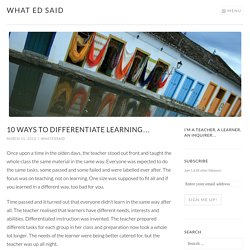
Everyone was expected to do the same tasks, some passed and some failed and were labelled ever after. The focus was on teaching, not on learning. One size was supposed to fit all and if you learned in a different way, too bad for you. Time passed and it turned out that everyone didn’t learn in the same way after all. The teacher realised that learners have different needs, interests and abilities. She needed to think about differentiation in a different way. 10 ways to differentiate learning… 1. Give the students (at least some) ownership of their learning. 2. One size does not fit all. 3. Learners don’t need total mastery of all the skills before they can apply them. 4.
Blogging, film making, global interactions, social media, photography, gaming (and much more!) 5. Encourage learners to follow their interests. 6. It’s not about a test at the end. 7. 10 ways to encourage student reflection… Split Screen Teaching Optimal learning occurs when students are active participants in their own learning, rather than passive recipients of teacher-delivered content.
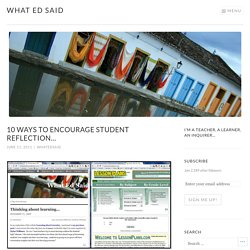
For this to be effective, students really need to think about their learning. Today we will be learning about… Remember when we used to start a new unit with the words ‘Today we will be learning about...’?
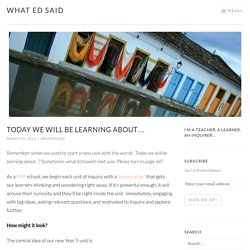
Sometimes what followed next was ‘Please turn to page 46′. As a PYP school, we begin each unit of inquiry with a ‘provocation‘ that gets our learners thinking and wondering right away. Todd Parr - Photos du journal. Australian Library and Information Association. LibraryCirculationControlCard.pdf. Fun Facts for Kids on Animals, Earth, History and more! OpenSSO (Login) School Library Association of NSW. Infographics.
Infographics. Infographics. Infographics. Infographics. Infographics. Infographics. Infographics. Infographics. Infographics. Infographics. Infographics. Infographics. Infographics. Infographics. Infographics. Infographics. Infographics. Infographics. Infographics. Infographics. Bloom-verbs.jpg (JPEG Image, 800 × 2160 pixels) - Scaled (46%) 27 Things Your Teacher Librarian Does.